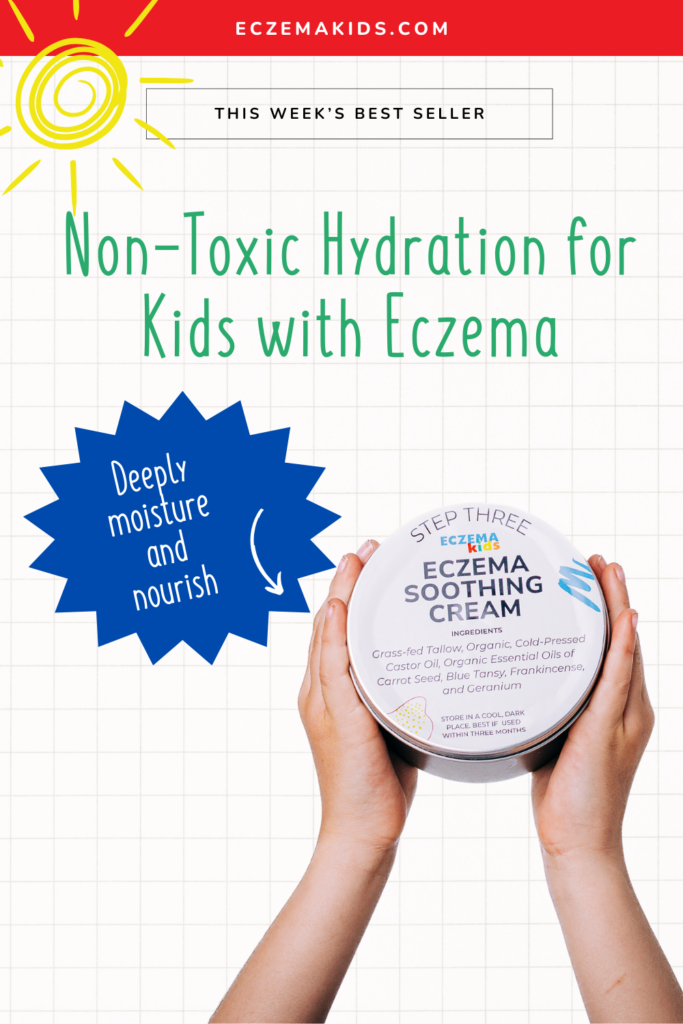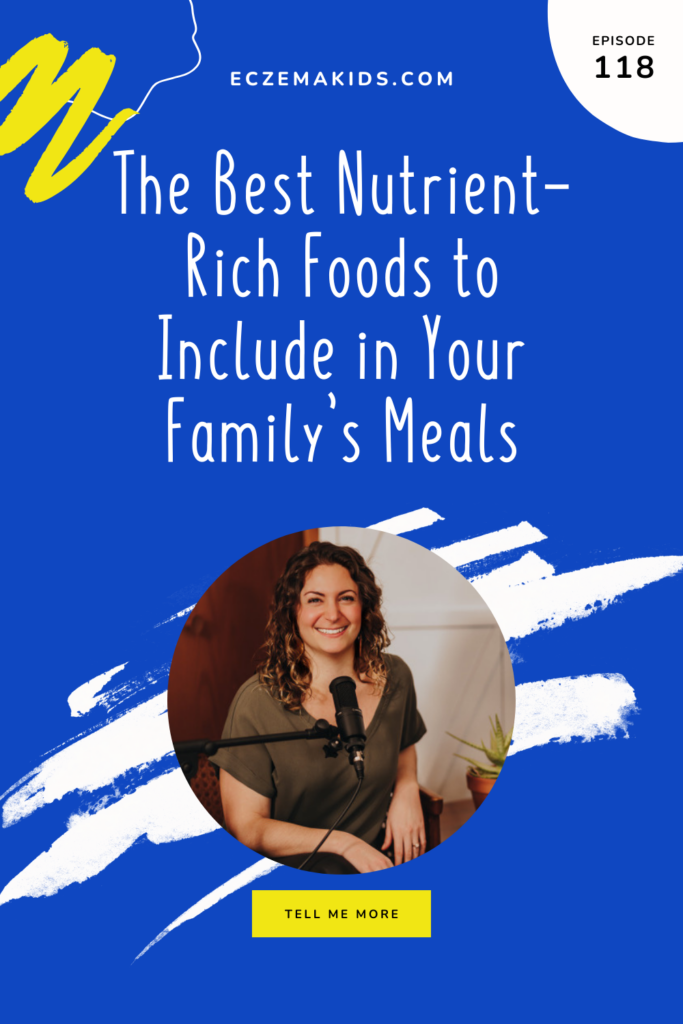If your child has eczema, they are in desperate need of the most nutritious foods possible. Enter nutritionist Elaine Welsh of the Renegade Nutrition Podcast. Elaine and myself give you pro tips on how to introduce nutrient-dense foods into your child’s diet and navigate the health challenges that plague your family right now. Whether you’re just starting out with an infant or trying to change the eating habits of an older child, these strategies can help ensure your family gets the best nutrition possible.
Listen Below For The Entire Episode on The Eczema Kids Podcast
Tips to Help Your Kids Eat More Nutrient-Dense Foods
One of the most important pieces of advice I give to clients is to introduce nutrient-dense foods as early as possible. The best time to start is when they’re young, but it’s never too late to make changes. If your kids are older, it might be more challenging, but it’s definitely doable.
Elaine prioritizes foods that are packed with nutrients. Here’s a glimpse into what that looks like:
- Bone Broths and Slow-Cooked Meats: We include nourishing bone broths and slow-cooked meats in our meals. These are great for gut health and are packed with minerals. If your family can tolerate them, these foods are a fantastic addition.
- Organ Meats: Organ meats are nature’s multivitamins, rich in every mineral and nutrient the body needs. Here’s how we incorporate them:
- Braunschweiger: We get this organ meat sausage from US Wellness Meats, which includes heart, liver, and kidney blended into ground beef. It’s delicious with a slice of cheese.
- Cod Liver: We use Icelandic cod liver. It’s mild and mixes well into tuna or salmon salads without tasting fishy.
- Organ Meat Blends: We buy organ meat blends from local stores, like Thousand Hills pasture-raised blend, and mix them with regular ground beef to stretch our budget and increase nutrient intake.
- Local Meat Shares: We participate in meat shares from local farmers, which provide us with nutrient-rich organ meats like cow hearts and chicken livers. Blending these into ground meat dishes helps incorporate these vital nutrients seamlessly.
Sneaking Veggies into Meals
Getting kids to eat vegetables can be a challenge, but there are creative ways to make it easier:
- Blended Veggie Sauces: One of my favorite methods is to blend steamed butternut squash, onions, and cauliflower into a creamy sauce. Add butter or coconut milk for creaminess and a splash of turmeric for added benefits. This sauce works wonderfully with rice pasta, spaghetti squash, or zucchini noodles.
- Soups and Stews: Incorporating a variety of vegetables into soups and stews can make them more palatable for kids. Blending veggies into the broth ensures they get the nutrients without noticing the vegetables.
- CSA and Local Veggies: Joining a CSA (Community Supported Agriculture) program allows us to get fresh, local vegetables that are more nutrient-dense than store-bought options. These seasonal vegetables are not only healthier but also help support local farmers.
Tips for Picky Eaters
Even if your child is a picky eater, there are ways to sneak in those important nutrients:
- Organ Meat Blends: Mixing organ meats into ground beef for dishes like taco salad, meat sauce, or soups makes the taste undetectable. This is a great way to ensure your child gets the benefits of organ meats without the strong flavor.
- Disguised Veggies: Blending vegetables into sauces or soups is a sneaky way to incorporate them into meals without kids noticing. For instance, a creamy sauce made from blended cauliflower and squash can be used in pasta dishes.
- Consistent Exposure: Continuously offering a variety of nutrient-dense foods can help children develop a taste for them over time. My daughter, who is now 11 months old, has been exposed to a wide range of flavors, including fish, organ meats, and vegetables, setting a foundation for healthy eating habits.
Encouraging Healthy Eating Habits
Starting young is ideal, but even if your kids are older, you can still introduce and emphasize the importance of nutrient-dense foods. Here are some additional tips:
- Be a Role Model: Kids are more likely to eat healthy foods if they see you eating them too. Make a point of enjoying nutrient-dense meals together as a family.
- Involve Kids in Cooking: Getting kids involved in the kitchen can make them more interested in trying new foods. Let them help prepare meals and learn about the benefits of the ingredients you’re using.
- Educate About Health: Teach your children about the importance of nutrition and how different foods can help their bodies grow strong and healthy.
Remember, the goal is to make small, manageable changes that can lead to a healthier lifestyle for your family. By focusing on nutrient-dense foods and finding creative ways to incorporate them into meals, you can ensure your children get the best possible start in life.
“Advice for older children when you’re introducing new foods? Don’t Yuck Someone Else’s Yum! You’re a leader to your younger siblings and they are watching you!” – Elaine Welsh
Navigating Eczema Within The Traditional Medical Model
In today’s world, parents face a barrage of environmental, dietary, and emotional toxins. This can be daunting, especially when managing a child’s health. Here are some practical tips Elaine offers to help navigate these challenges:
- Focus on Controllable Factors: Start by improving your home environment. Eliminate processed foods, refined sugars, grains, and artificial additives. A clean diet and living space can significantly enhance health.
- Believe in the Body’s Healing Power: The human body has an incredible ability to heal itself. By providing the right nutrients and reducing exposure to harmful substances, you can support this natural process.
- Communicate with Caregivers: Ensure that teachers and caregivers are aware of your child’s health needs. Clear communication about dietary restrictions and health practices can help create a consistent, supportive environment.
- Be Prepared: Keep healthier alternatives on hand for school events or special occasions. Simple substitutions, such as using non-toxic cleaners and personal care products, can reduce exposure to harmful chemicals.
Advocating for Yourself in the Conventional Medical Model
Navigating the conventional healthcare system can be daunting, especially when you’re faced with a pressing health concern or a diagnosis that leaves you searching for answers. As someone deeply passionate about holistic health, I’ve encountered countless clients who feel overwhelmed and unheard in their medical journeys. Here’s my advice on how to advocate for yourself effectively and make informed decisions that truly align with your health needs.
Arm Yourself with Research
One of the most crucial steps in advocating for your health is to come prepared with research studies that support your decisions or requests. It’s important to recognize that most doctors are not keeping up with the latest research in nutrition or alternative treatments. They are typically not research scientists, and their primary source of information is the policies set by the health institutions they work for. This means they might not be aware of newer studies that could be beneficial to your health situation.
For example, during Elanie’s struggle with infertility, I requested a series of blood tests from my regular doctor, which he initially questioned. By providing peer-reviewed research articles linking vitamin A and D levels to fertility, I was able to justify my request and get the tests ordered. This approach not only empowered me but also helped my doctor understand my perspective.
Understand the Limits of Conventional Medicine
Conventional medical practitioners have a specific set of tools and treatments they are trained to use, and these are often centered around pharmaceuticals and surgeries. While these can be life-saving and necessary in many cases, they might not always be the best first line of defense for chronic or autoimmune conditions. Understand that their advice will often be limited to what their training and the medical establishment’s guidelines dictate.
If you’re looking for holistic approach for eczema, THIS IS YOUR SOLUTION. In the Natural Eczema Solutions Course we are addressing not just diet and nutrition, but supplements, symptom management, home modifications and testing. It’s sincerely a holistic solution that any mere mortal parent can incorporate and execute.
The Changing Landscape of Healthcare
Despite the challenges, Elanie sees a promising shift in the healthcare landscape. More people are becoming informed about their health and the impact of lifestyle choices on their well-being. There’s a growing awareness of the need for a more integrated approach to health that combines conventional medicine with holistic practices.
This shift is slowly influencing the medical community as well. With the rise of virtual appointments, it’s easier than ever to find and consult with holistic health practitioners from around the world. This accessibility is empowering individuals to take charge of their health in ways that were previously difficult.
The Best Health Outcomes Come From Collaboration and Preparedness
Being an advocate for your health requires preparation, confidence, and a willingness to seek out information and alternative opinions. Same goes for feeding your kids and nourishing theme well. Incorporate organ meats! Get those veggies into anything you can! You can do this, and if you need help or want to fast-track your results, The Natural Eczema Solutions Course is for you!
If you’re hoping to continue the conversation surrounding nourishing and feeding your kids with eczema, check out, The Best Eczema-Healing Diet, Unsuspected Eczema-Triggering Foods AND What to Eat Instead, Eczema-Triggering Foods and What the Eat Instead PART TWO.


FAQ
How can I get my kids to eat more nutrient-dense foods if they are picky eaters?
Elanie suggests organ meat blends into ground meat, organ meat sausage and sneaking veggies into any sauce Introduce new foods gradually and in different forms. Involve your kids in meal preparation to make them more interested in trying new foods. Don’t be afraid to serve nutritious, familiar dishes multiple times a week. If you’re looking for a non-triggering, eczema-healing diet for your family, The Natural Eczema Solutions Course is for you my friend!
